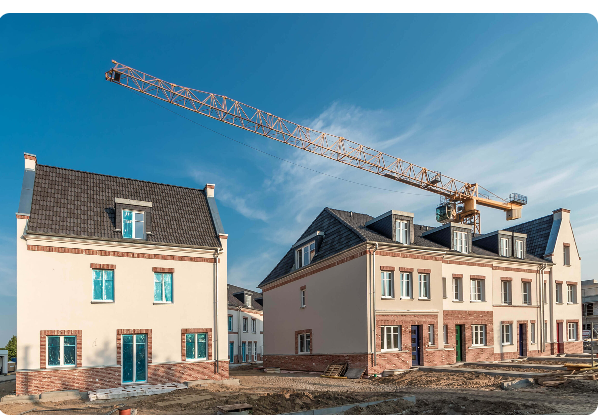Gareth Davies, senior business development manager at Hodge Real Estate Finance, shares how Hodge is providing regional developers with more than just the financial tools to succeed in today’s challenging market.
 As the house building sector verges on something special in 2025, he believes that flexible, relationship-driven finance could be the missing link in today’s property development supply chain.
As the house building sector verges on something special in 2025, he believes that flexible, relationship-driven finance could be the missing link in today’s property development supply chain.
“I kind of fell into real estate finance” Gareth says. “I trained as an accountant at Grant Thornton in London and qualified in 2000 through corporate finance, rather than the traditional audit and business route, so I was a bit of an outlier in that regard. After some years in structured finance at RBS – particularly in the private equity space – I moved into real estate finance in 2009 and joined Hodge about ten years ago.”
The market has changed dramatically since then.
“The real estate finance market looked very different 15 years ago. Today, developers are dealing with a slowdown in house sales, longer project timelines and higher borrowing costs. That’s where we come in – helping regional developers keep their supply chain moving with the right finance at the right time.”
At Hodge we’ve got a reputation for being a flexible lender.
“A lot of banks take a rigid approach, but we’ve created a solution whereby our traditional development finance goes up to 65% loan to gross development value – but we can stretch that to 75% in the right circumstances, which is a real advantage in today’s market. It’s effectively like having mezzanine finance, bridging the gap between debt and equity, but ours is all senior debt, so it’s all on one facility, meaning there’s one lawyer, one project monitor, one valuer – helping developers move faster.”
That flexibility extends to the types of projects we support.
“We typically work in the £2m-£10m space, and our developers are often working on anywhere between two and 10 sites at once, all at different stages. I’ve got one deal on my desk that’s just three houses in the South East, and another that’s 56 units pre-let to a housing association. The range is huge.”
Delivering quickly is just as important.
“We’ve had a lot of feedback that it can take too long to move from a credit approval to draw down. At Hodge, we target eight weeks from the offer to draw down. It depends on everyone pulling together and the information flow being timely, but we’re set up to deliver that. Not every lender is.
“Because we’re a small team – 18 of us in real estate finance – we oversee the whole transaction. If I originate a transaction, I stay with it through credit, legal, due diligence and drawdown. That’s very valuable to our clients.”
After several tough years for developers, Gareth is cautiously optimistic for the future.
“Coming out of Covid, it looked like things were improving – but that’s when we had the war in Ukraine, inflation, material and labour shortages, plus rising mortgage rates. That’s all hit house builder’s margins and made it harder to justify starting projects.
“We’ve seen a really significant decrease in the number of development starts across the UK over the last two years. And we’re probably on a rate of around about 130,000 to 140,000 houses a year at the moment in the UK – way below the previous government’s plans, and even further short of the of the current government’s plans.”
“But we are seeing the base rates and inflation stabilise. That stability gives developers confidence. And we’re seeing more enquiries, not just from house builders looking for funding, but actually pulling the trigger on new developments.”
Hodge is very much ‘open for business’.
“I’m excited about the year ahead for Hodge. Last year was about defining our strategy. Now were focused on house builders in that £2m-£10m space. We’ve ring-fenced capital to support the sector and we’re aiming to grow our book by £50m-£100m a year over the next five years. Supporting regional house builders across the UK is central to that.”

